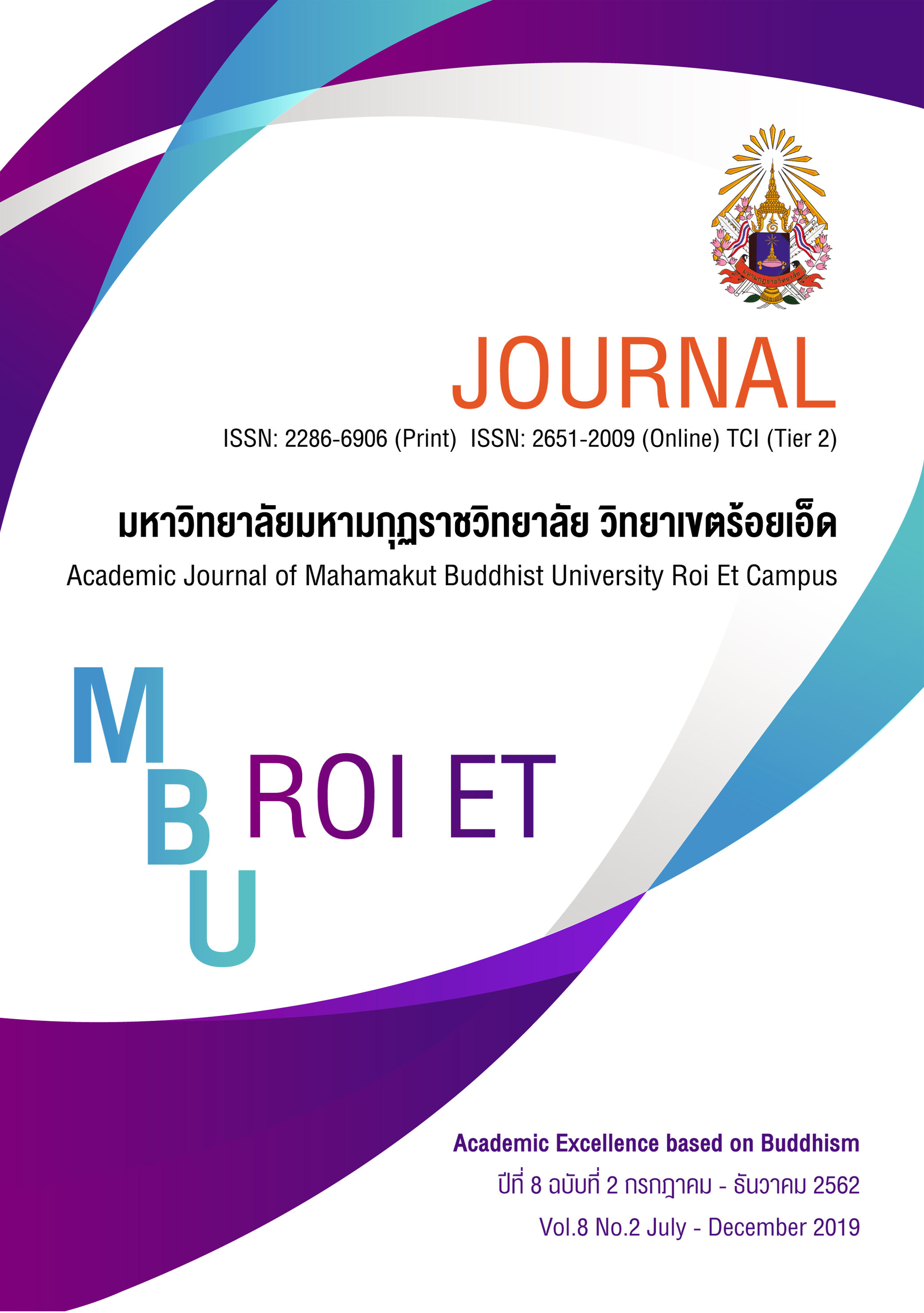The Development of Teaching Profession based on Iddhipada Dhamma IV in Phrapariyatti Dhamma Schools (General Education), Chaiyaphum Province
Main Article Content
Abstract
The aims of this mixed method research were: to study and compare the conditions of the development of teaching profession based on Iddhipada Dhamma IV (iddhipāda, path of accomplishment) in PhrapariyattiDhamma schools (General Education) in Chaiyaphum province. The samples of this study were 100 of educational administrators and teachers, selected by simple random based on the Krejcies& Morgan method and the target group included 12 of those selected by purposive sampling. The tools used to collect the data were the questionnaire with its reliability value of .97 and the structured interview. The obtained data were analyzed by the following statistics: Percentage, Mean, Standard Deviation, t-test and f-test (One Way ANOVA) and the qualitative data were interpreted by the descriptive analysis.
The research results were as follows:
1) The mean scores in both overall and studied aspects of the conditions of the development of teaching profession based on Iddhipada Dhamma IV in PhrapariyattiDhamma schools (General Education) in Chaiyaphum province were at a high level. The highest can be seen in that of the aspect ‘performance based on Iddhipadadhamma IV, followed by that of ‘self-practice based on Iddhipada dhamma IV and ‘learning standard and profession based on Iddhipada dhamma IV respectively.
2) Classified by their personal factors: state, education and work experience, the comparative mean scores from the study of the samples’ opinions towards the development of teaching profession based on Iddhipada Dhamma IV were different with the statistical significance level at .01.
3) The guideline for the development of teaching profession based on IddhipadaDhamma IV in Phrapariyatti Dhamma schools (General Education) in Chaiyaphum province is as follows: 1) in terms of the standard of knowledge and professional experience, information technology to promote teaching and learning to focus on students should be used appropriately; learning activities and improve learning quality should be organized continuously and schools should support the development of community learning resources and create the up-to-date communication technology systems information. 2) In terms of work standard, the administrators should support educational institutions collaboration by using electronic media to develop academic administration with other educational institutions; they should promote performance evaluation with modern information systems efficiently and should develop public relations, education management for parents, communities and society to quickly access information sources. 3) Standards of conduct, the schools should promote the use of various knowledge in performing duties and exchanging knowledge with members in the organization with the commitment to encourage students and service recipients to participate in learning plans and the schools should promote the creation of good relations between administrators, teachers and educational personnel in educational institutions.
Article Details
References
ผ่องพรรณ ตรัยมงคลกุล. (2555). “การวิจัยแบบผสม: ทางสายกลางของการวิจัย” การออกแบบการวิจัย. กรุงเทพมหานคร : สํานักพิมพ์มหาวิทยาลัยเกษตรศาสตร์.
พระมหาจำเริญ ปะการะโพธิ์. (2543). การดำเนินงานโรงเรียนพระปริยัติธรรม แผนกสามัญศึกษา จังหวัดขอนแก่น. การศึกษาค้นคว้าอิสระการศึกษามหาบัณฑิต. บัณฑิตวิทยาลัย : มหาวิทยาลัยมหาสารคาม.
พิมพร แคล้วคลาด. (2558). แนวทางการพัฒนาครูตามเกณฑ์มาตรฐานวิชาชีพครูสังกัดสำนักงานเขตพื้นที่การศึกษาประถมศึกษาระนอง. วิทยานิพนธ์ศึกษาศาสตรมหาบัณฑิต สาขาวิชาการบริหารการศึกษา. บัณฑิตวิทยาลัย : มหาวิทยาลัยราชภัฏสวนสุนันทา.
วิชญาภา เมธีวรฉัตร. (2554). การพัฒนาทรัพยากรมนุษย์ตามหลักอิทธิบาท 4 : กรณีศึกษาโรงเรียนคีรีวงศ์วิทยา จังหวัดนครสวรรค์. ปริญญานิพนธ์พุทธศาสตรมหาบัณฑิต (รัฐประศาสนศาสตร์). บัณฑิตวิทยาลัย : มหาวิทยาลัยมหาจุฬาลงกรณวิทยาลัย.
สมศักดิ์ บุญปู่. (2547). พระสงฆ์กับการศึกษาไทย. กรุงเทพมหานคร : มหาจุฬาลงกรณราชวิทยาลัย.
M.J Johnson and K. Button. (1998). Action Research Paves the Way for Continuous Improvement. Journal of Staff Development. 19(1). 48-51.


